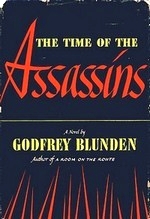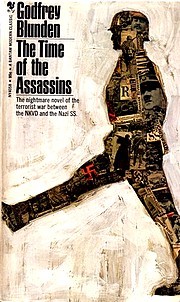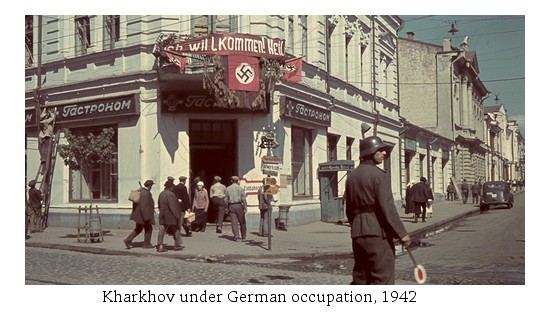 I first read Godfrey Blunden’s The Time of the Assassins back in the late 1970s, after coming across a copy of the Bantam Modern Classics paperback reissue. The tag line on the cover read, “The nightmare novel of the terrorist war between the NKVD and the Nazi SS.” I was intrigued to find this unfamiliar author and title, and this subject, packaged as a “modern classic”, along with such established titles as All the King’s Men, Darkness at Noon, and Lady Chatterley’s Lover.
I first read Godfrey Blunden’s The Time of the Assassins back in the late 1970s, after coming across a copy of the Bantam Modern Classics paperback reissue. The tag line on the cover read, “The nightmare novel of the terrorist war between the NKVD and the Nazi SS.” I was intrigued to find this unfamiliar author and title, and this subject, packaged as a “modern classic”, along with such established titles as All the King’s Men, Darkness at Noon, and Lady Chatterley’s Lover.
Anthony West reviewed the book for the New Yorker when it was first published in 1952, and I will quote him at length to tell what the book’s about:
Godfrey Blunden is a newspaperman, and his novel about the Nazi occupation of the Russian city of Kharkov, The Time of the Assassins, is more a matter of reporting than of invention. But while it has no great aesthetic appeal and cannot be given much credit for literary grace, it makes its points in a blunt way and tells its horrid and fascinating story effectively. Mr. Blunden was in Russia during the war, and he was one of the correspondents who entered Kharkov soon after it was first retaken from the Germans. From the things he saw and heard among the ruins, and the things he learned later, he has constructed a convincing account of what happened in the town. In a sense it is stale news and of very little interest; Kharkov was lost to the Germans as they pressed eastward across the steppes toward Stalingrad, recovered after a year or so, lost again in a week, and finally retaken and held. A story of the events, and of the atrocities, during this swaying to and fro would be sad but boring because it is the story of too many towns and one already knows it too well. But Mr. Blunden is not reporting at that level; he is concerned with states of feeling and with what the time meant to people whose lives were altogether changed by the events that poured over them.
… The Germans took Kharkov is a rush, so unexpectedly and so rapidly that all public records fell into their hands. Among them were lists of members of the Communist Party. While the city was still welcoming the Germans as liberators who had brought an end to the years of terror and purges that had begun in the early thirties, the Gestapo began hanging their way through the lists. Within a few days there was not a street, square, or public building in Kharkov that was not decorated with the supreme emblems of cruelty — hanged men and women….The long-drawn-out process of disillusion began as the Ukrainian welcome to the foreign liberators was choked into stunned silence. At first the S.S. confined themselves to wiping out the Communists, and since the Party itself had ruled by terror, the German butchery seemed like the first step to setting up a rational state. But then came the massacres of prisoners of war, and then the massacres of the Jews, and then massacres of Slavs to make room for German colonists…. The unbelievable had happened; the liberators had brought with them a way of life worse than anything a sane man could imagine. The only hope was the return of the men who had made government an affair of secret denunciations, terror, and cold remoteness. It is human nature to reject despair. Mr. Blunden’s teacher and her friends believed that what they were going through might mean an end to government by terror — that it was impossible to live through it without learning how important kindness and gentleness and the humanitarian values were. When the Germans were driven out, something better would come.
But kindness and gentleness proved to be disloyalty to the only force that could drive the Germans out…. The Party came back, hardened, more tenacious, more uncompromising than ever, and among the first people it killed was the teacher.
The closing passage of The Time of the Assassins vividly depicts this grim denouement. After years of Soviet-managed famines and Stalinist purges, after battle, conquest, and a year of ruthless German occupation and exterminations, the few surviving innocents are smashed before they even have the chance to catch their breath:
In these cold battlefields and devastated cities there are no grotesqueries. The dead lie as in sleep, quietly no-sleeping, may lie there for as long as there is frost, the snow sweeping over them like a soft lace shroud, the flesh waxed and pink as with health. Nor does high explosive make that much difference or, as with this old woman, the rifle butt. Lying there on the floor her face broken, she is yet human, real, still clutching the old string bag with which, evidently, she attempted to fight her aggressors. And the children about her skirts! The children in the corners of the room! In the other rooms! Difficult even to see where they had been shot, lying there in sleeping attitudes, little bundles of ice-starched clothes, bullet-tinctured somewhere, frozen, perfect small angular faces, thin drumstick legs. There in the old schoolhouse, in the ruin of broken-in windows, torn-up floor, over-turned stove, in the confusion of rags and refuse, they are not in themselves horrifying; when the life-ending is less pathetic than the life-in-living, death may seem even pretty and peaceful. This is what Maryusa is thinking as she walks through the streets, a pace ahead of her captor: there are no lives any longer, therefore no responsibility; all that for which she has fought so stubbornly is now disposed of. She is not thinking of punishment; there being none to punish the doer, that is, none above the human authority by which this action was condoned. In her mind there if only peacefulness. It is not bad that the children are dead. The struggle was carried on, but now it is ended. Already in the basement room of the NKVD she awaits her own prompt demise with the same expectancy.
… Later (we remember) there were some in Moscow who thought the liquidation of the Kharkiv [Blunden uses the Ukrainian name for the city] schoolteachers precipitate. But the matter was soon forgotten, for not much over a week later (it seems so long ago now as to be hardly worth mentioning), the Germans were back in Kharkiv.
 If history is a broom, sweeping back and forth through time, then The Time of the Assassins is history told from the dust’s perspective. The truly nightmarish aspect of the experience of the survivors of Kharkov is that the purpose of the Soviets’ purge after retaking the city was rendered moot in the space of a week or so. There was no safe situation: side with either the Soviets or the Germans and you risked being killed as the other’s enemy. Attempt to remain neutral and focus on surviving, and you risked being wiped out by either side’s blind adherence to its ideology. It would not be too hard to see some parallels between the Kharkov of The Time of the Assassins and Baghdad and other Iraqi cities today, where there is danger in taking sides with the Shiites or Sunnis or Americans and danger in not taking sides. One wonders if retaining hope in such a situation isn’t just as insane as the monomanias of the various factions.
If history is a broom, sweeping back and forth through time, then The Time of the Assassins is history told from the dust’s perspective. The truly nightmarish aspect of the experience of the survivors of Kharkov is that the purpose of the Soviets’ purge after retaking the city was rendered moot in the space of a week or so. There was no safe situation: side with either the Soviets or the Germans and you risked being killed as the other’s enemy. Attempt to remain neutral and focus on surviving, and you risked being wiped out by either side’s blind adherence to its ideology. It would not be too hard to see some parallels between the Kharkov of The Time of the Assassins and Baghdad and other Iraqi cities today, where there is danger in taking sides with the Shiites or Sunnis or Americans and danger in not taking sides. One wonders if retaining hope in such a situation isn’t just as insane as the monomanias of the various factions.
Lionel Trilling wrote the introduction to the Bantam Modern Classics edition, and I will let him provide the critical assessment of The Time of the Assassins:
I have no knowledge of what literary model Godfrey Blunden had in mind for his remarkable novel, The Time of the Assassins. But if I had to guess by whom he had regulated his tone and attitude, I should think it was not a novelist at all. My own reference as I read Mr. Blunden’s book was to certain historians, to Thucydides and to Tacitus, and, in a lesser degree, to Josephus. Like them, Mr. Blunden tells a story to which the only possible response might seem to be despair. Like them he maintains the power and fortitude of his mind, and of ours, before the terrors of actuality.
This is, I believe, a very considerable achievement, possibly a great one. It is first to be thought of as a literary achievement. Nothing could be more difficult than to present human extremity without, on the one hand, falsifying or mitigating the facts, or, on the other hand, assailing and subduing our minds with the details of horror. It is also a moral achievement, of the intelligence put at the service of the emotions.
… Yet if what Mr. Blunden tells us is more terrible than what we read of in the old historians, still Thucydides’ account of the Melian massacre, or of the plague at Athens, or of the death of the Athenian army in the Sicilian quarry, or, again, Tacitus’ record of the tyranny, torture, and treachery of the Roman civil wars, or Josephus’ narrative of the war against the Jews, are the ancient analogue of what the modern world has experienced in more extravagant form. And in the attitude of the historians, in their determination to maintain the power and integrity of the mind before the decay of the very fabric of society and the human soul, we have the tradition in which Mr. Blunden has put himself.
… The narrowness of the circumstances in which Mr. Blunden’s characters must exist, the limitation of their power of choice, is, as I have suggested, a disadvantage to the novelistic imagination. It is a measure of Mr. Blunden’s quality, of his literary power, his intelligence, and his moral commitment, that he overcomes this disadvantage. He overcomes it by realizing the power of the historical imagination. Like Thucydides, he derives his information in part from personal observation — he was for many years a correspondent in Russia and in that capacity was with the Red Army at Stalingrad and when it made its first reinvestment of Kharkov — and in part from careful inquiry. His commitment is to fact and to essential truth, which he serves no less by his imagination than by his experience and research. There is no page of his work that does not compel our admiring interest.
Locate a Copy
- Look for it at Amazon.com: The Time of the Assassins
- Look for it at Amazon.co.uk: The Time of the Assassins
- Look for it at AddAll.com: The Time of the Assassins


Thanks for the comment. This is definitely a powerful book that bears reading by anyone who wants to get a taste of life where none of the givens and certainties we are used to apply. It makes you wonder how anyone stayed sane in a place like Kharkhov.
I first read this book some 40 years when the Bantam Classics edition appeared and have been haunted by it ever since. I’ve just re-read it and had a bad night’s sleep – as powerful and disturbing as it was the first time. I’m surprised that Anthony West could have been so negative about it – Trilling was much more on the mark. I was rather baffled by the unconventional non-novel style on first reading and I think Trilling explains the effect of that very well. One of the great unsung fictional works about WW2 and as you say with a resonance far beyond that particular war.